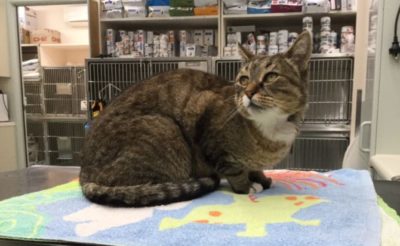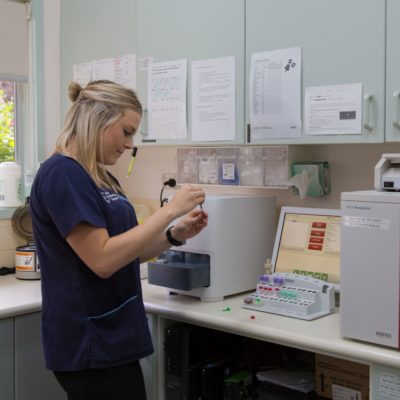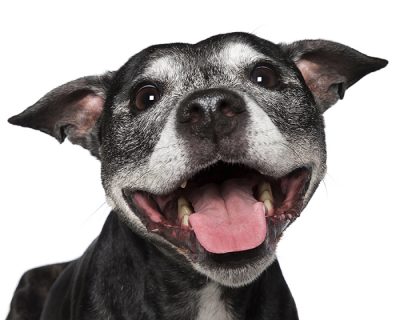 Behavioural problems in senior pets can result from medical issues like arthritic pain, loss of sight/hearing or diseases that affect the nervous system. They can also be attributed to age related deterioration of the brain known as Cognitive Dysfunction Syndrome.
Behavioural problems in senior pets can result from medical issues like arthritic pain, loss of sight/hearing or diseases that affect the nervous system. They can also be attributed to age related deterioration of the brain known as Cognitive Dysfunction Syndrome.
In mild cases the pet may sleep more, become less responsive or show less social interaction with family and other pets. More severe signs might include repetitive behaviours such as pacing, new fears and anxieties, house soiling, waking at night, confusion and disorientation or loss of recognition of training cues.
The behaviour changes may be noticed following changes to the household or environment that the pet has difficulty adapting to. Early detection provides the best opportunity to help these pets and slow cognitive decline.
Prevention: What can you do?
- For healthy senior pets, twice-yearly wellness examinations and laboratory screening tests provide an opportunity to identify emerging problems, sometimes before there are outward signs.
- Report changes in your pet’s health and behaviour to the vet early.
- If you foresee changes in your pets environment or schedule, try to make these gradual so you elderly pet has time to adapt.
- Providing mental and physical enrichment helps to maintain a healthy brain and body. If your pet begins to slow down, find new games, new toys and new ways to play to stimulate the brain and keep the body active.
- Play and exercise help most if continued throughout life and adjusted for age related physical limitations, for example supported swimming for arthritic dogs.
- Leash walking exercises muscles and provides mental stimulation via smell and social interactions. Use a harness, sling or pram/stroller if they can’t manage walking. Take a ‘sniff stroll’ rather trying to cover ground. Trim nails and hair under their feet for a better grip.
- Supervise play and pick mates matched by temperament, ability and size. Redirect the new puppy play if your old pet tires. Watching play may be enough.
- Car trips are fun for some dogs. They enjoy the tactile sensations of the breeze, the smells and company. A ramp may be needed for access and comfy padding in the vehicle to cushion old joints. Take care in warm weather to prevent overheating.
- Be creative in seeking ways to make it easier for them. Elevate the water dish to shoulder height; warm food and add water/broth to food to increase palatability and water intake; give cats more litter trays for convenient access and cut down tray height; set up ramps to reduce the need to use stairs; cats benefit from stepped platforms leading to high perches; have the cat/dog flap at floor level; use hall runners or a paw friction product to provide grip on slippery floors; add psyllium to the diet to reduce constipation; clip heavy coats and matts for freer movement and summer comfort; provide a winter coat if they feel the winter chill.
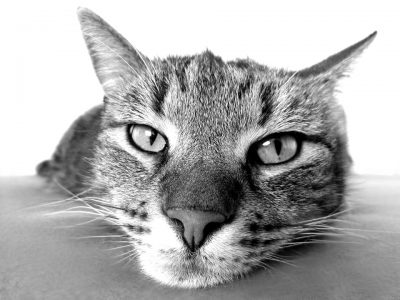
- Smell provides great mental stimulation. Provide food puzzles and hidden treats. Visit unfamiliar places.
- Hand signals or vibrating (NOT shock) collars can be used to communicate to deaf dogs. Lavender scent trails can guide the blind.
- Practice massage and range of motion exercises for sore legs.
Treating problems: How can you help?
- Medical problems need to be identified and treated, however retraining may also be required. For example, if your pet begins house soiling due to a medical issue, the problem may persist after the medical issue is resolved unless you use positive reinforcement to train the pet to return to the preferred locations and supervise access to the soiled areas.
- For problems that cannot be completely resolved, you may need to make schedule adjustments to accommodate your pet’s needs. For example pets with kidney disease need to urinate more often so you may need to take your dog out to the toilet more frequently or reward them for using training pads. Provide extra litter trays or clean the litter tray more frequently if your cat urinates more due to kidney disease.
- Maintain an enriched environment that stimulates your pet’s brain and body. Adjust their social play, exercise and training according to their health. Use their favourite food and toys to train new cues, practice previous training and play games of hide and find. Food release toys that provide manipulation to obtain the food or treats provide a challenge to stimulate your pet’s mind.
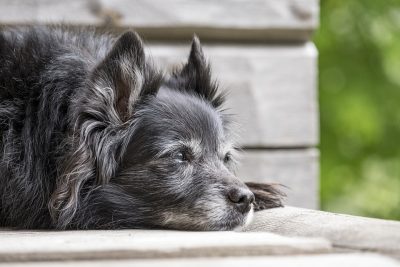
Veterinary treatment:
- Medications can be prescribed to improve neurotransmitter function and brain activity or act as antioxidants. Medication that reduces physical pain, for example from arthritis, can allow your pet to enjoy more physical and mental activity.
- A prescription veterinary diet is available containing antioxidants and fatty acids that reduce signs of cognitive decline by improving neurotransmission. It has been shown to help old dogs stay active, enjoy interactions, reduce sleep disturbances and retain house training.
- Many natural products are touted to be effective and your vet will be able to advise you on supplements that may be useful.

